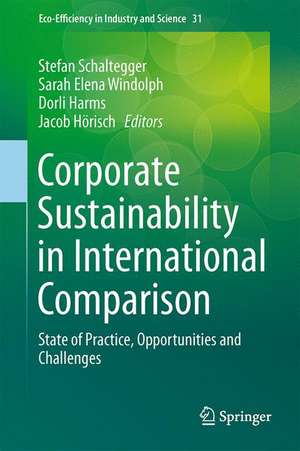Corporate Sustainability in International Comparison: State of Practice, Opportunities and Challenges: Eco-Efficiency in Industry and Science, cartea 31
Editat de Stefan Schaltegger, Sarah Elena Windolph, Dorli Harms, Jacob Hörischen Limba Engleză Hardback – 29 iul 2014
Building on original data based on results of the International Corporate Sustainability Barometer survey, this book depicts and analyzes the current state of corporate sustainability management and corporate social responsibility.
Part I describe the approach and summarizes the broad results, outlining the methodology and offering an overview of results of the ICSB survey. Part II presents specific findings for each of eleven countries surveyed: Australia, Belgium, France, Germany, Hungary, Japan, Korea, Spain, Switzerland, the United Kingdom and the USA. Part III provides a comparative analysis and highlights broad patterns in the international results. Most strikingly, the book reveals surprisingly widespread similarities among the sustainability management practices of large companies in economically developed countries all over the world.
All the survey results are analyzed according to the same Triple-I approach: Intention - Why do companies manage sustainability?; Integration - To what extent do companies embed sustainability in their core business and in their organization? And Implementation - How is corporate sustainability operationalized? Based on this structure the analysis serves not only to make comparisons and to investigate national characteristics; it also builds a foundation for examining whether there truly is a world-spanning common state of the art of corporate sustainability. Distinguished authors who were involved in the International Corporate Sustainability Barometer project offer their insights, identifying and discussing national and international patterns that can provide the basis for further ideas and inspiration topractitioners and researchers worldwide who are engaged in corporate sustainability.
| Toate formatele și edițiile | Preț | Express |
|---|---|---|
| Paperback (1) | 639.59 lei 43-57 zile | |
| Springer International Publishing – 17 sep 2016 | 639.59 lei 43-57 zile | |
| Hardback (1) | 645.79 lei 43-57 zile | |
| Springer International Publishing – 29 iul 2014 | 645.79 lei 43-57 zile |
Din seria Eco-Efficiency in Industry and Science
- 9%
 Preț: 901.53 lei
Preț: 901.53 lei - 18%
 Preț: 951.29 lei
Preț: 951.29 lei - 15%
 Preț: 640.24 lei
Preț: 640.24 lei - 15%
 Preț: 654.77 lei
Preț: 654.77 lei - 15%
 Preț: 648.42 lei
Preț: 648.42 lei -
 Preț: 391.61 lei
Preț: 391.61 lei - 15%
 Preț: 642.51 lei
Preț: 642.51 lei - 15%
 Preț: 643.34 lei
Preț: 643.34 lei - 18%
 Preț: 957.62 lei
Preț: 957.62 lei - 18%
 Preț: 953.35 lei
Preț: 953.35 lei - 18%
 Preț: 1238.74 lei
Preț: 1238.74 lei - 18%
 Preț: 1224.68 lei
Preț: 1224.68 lei - 18%
 Preț: 963.15 lei
Preț: 963.15 lei - 18%
 Preț: 2115.07 lei
Preț: 2115.07 lei - 18%
 Preț: 1388.53 lei
Preț: 1388.53 lei - 18%
 Preț: 1855.88 lei
Preț: 1855.88 lei - 18%
 Preț: 1234.94 lei
Preț: 1234.94 lei - 15%
 Preț: 643.00 lei
Preț: 643.00 lei - 15%
 Preț: 647.40 lei
Preț: 647.40 lei - 18%
 Preț: 1222.01 lei
Preț: 1222.01 lei - 15%
 Preț: 637.59 lei
Preț: 637.59 lei - 15%
 Preț: 648.42 lei
Preț: 648.42 lei - 15%
 Preț: 646.62 lei
Preț: 646.62 lei - 20%
 Preț: 590.95 lei
Preț: 590.95 lei
Preț: 645.79 lei
Preț vechi: 759.76 lei
-15% Nou
Puncte Express: 969
Preț estimativ în valută:
123.59€ • 128.55$ • 102.03£
123.59€ • 128.55$ • 102.03£
Carte tipărită la comandă
Livrare economică 14-28 aprilie
Preluare comenzi: 021 569.72.76
Specificații
ISBN-13: 9783319062266
ISBN-10: 3319062263
Pagini: 280
Ilustrații: XXII, 255 p. 124 illus., 18 illus. in color.
Dimensiuni: 155 x 235 x 21 mm
Greutate: 0.57 kg
Ediția:2014
Editura: Springer International Publishing
Colecția Springer
Seria Eco-Efficiency in Industry and Science
Locul publicării:Cham, Switzerland
ISBN-10: 3319062263
Pagini: 280
Ilustrații: XXII, 255 p. 124 illus., 18 illus. in color.
Dimensiuni: 155 x 235 x 21 mm
Greutate: 0.57 kg
Ediția:2014
Editura: Springer International Publishing
Colecția Springer
Seria Eco-Efficiency in Industry and Science
Locul publicării:Cham, Switzerland
Public țintă
ResearchCuprins
Part I.- Chapter 1: International Corporate Sustainability Barometer: Introduction and Structure.- Chapter 2: The International Corporate Sustainability Barometer: Purpose and Approach.- Chapter 3: Overview of the Aggregate Results of the International Corporate Sustainability Barometer.- Part II.- Chapter 4: International Corporate Sustainability Barometer – Australia.- Chapter 5: The Case of Belgium.- Chapter 6: International Corporate Sustainability Barometer 2012: Sustainability Management in France.- Chapter 7: Corporate Sustainability Management in Large German Companies.- Chapter 8: Sustainability Management in Hungary.- Chapter 9: Corporate Sustainability Barometer in Japan.- Chapter 10: Korean International Corporate Sustainability Barometer Survey 2012.- Chapter 11: Exploring Sustainability in Spanish Companies.- Chapter 12: State of the Art and Progress of Corporate Sustainability in Switzerland.- Chapter 13: Managing Responsible and Sustainable Business in the UK.- Chapter 14: The Case of Corporate Sustainability in the United States of America.- Part III.- Chapter 15: “Patterns & Conclusions”.- Index.
Textul de pe ultima copertă
Although every country is distinguished by its history, culture and language as well as its unique economic, environmental and social conditions, it can be expected that international operating companies will exhibit common patterns since sustainability challenges do not stop at national borders.
Building on original data based on results of the International Corporate Sustainability Barometer survey, this book depicts and analyzes the current state of corporate sustainability management and corporate social responsibility.
Part I describes the approach and summarizes the broad results, outlining the methodology and offering an overview of results of the ICSB survey. Part II presents specific findings for each of eleven countries surveyed: Australia, Belgium, France, Germany, Hungary, Japan, Korea, Spain, Switzerland, the United Kingdom and the USA. Part III provides a comparative analysis and highlights broad patterns in the international results. Most strikingly, the book reveals surprisingly widespread similarities among the sustainability management practices of large companies in economically developed countries all over the world.
All the survey results are analyzed according to the same Triple-I approach: Intention - Why do companies manage sustainability?; Integration - To what extent do companies embed sustainability in their core business and in their organization?; and Implementation - How is corporate sustainability operationalized? Based on this structure the analysis serves not only to make comparisons and to investigate national characteristics; it also builds a foundation for examining whether there truly is a world-spanning common state of the art of corporate sustainability. Distinguished authors who were involved in the International Corporate Sustainability Barometer project offer their insights, identifying and discussing national and international patterns that can provide the basis for further ideas andinspiration to practitioners and researchers worldwide who are engaged in corporate sustainability.
Building on original data based on results of the International Corporate Sustainability Barometer survey, this book depicts and analyzes the current state of corporate sustainability management and corporate social responsibility.
Part I describes the approach and summarizes the broad results, outlining the methodology and offering an overview of results of the ICSB survey. Part II presents specific findings for each of eleven countries surveyed: Australia, Belgium, France, Germany, Hungary, Japan, Korea, Spain, Switzerland, the United Kingdom and the USA. Part III provides a comparative analysis and highlights broad patterns in the international results. Most strikingly, the book reveals surprisingly widespread similarities among the sustainability management practices of large companies in economically developed countries all over the world.
All the survey results are analyzed according to the same Triple-I approach: Intention - Why do companies manage sustainability?; Integration - To what extent do companies embed sustainability in their core business and in their organization?; and Implementation - How is corporate sustainability operationalized? Based on this structure the analysis serves not only to make comparisons and to investigate national characteristics; it also builds a foundation for examining whether there truly is a world-spanning common state of the art of corporate sustainability. Distinguished authors who were involved in the International Corporate Sustainability Barometer project offer their insights, identifying and discussing national and international patterns that can provide the basis for further ideas andinspiration to practitioners and researchers worldwide who are engaged in corporate sustainability.
Caracteristici
Aggregates and analyzes ICSB survey data from 11 countries on 4 continents Interprets results based on the Triple I approach: Intention, Integration, Implementation Offers insights from distinguished authors of varied cultural and political backgrounds










